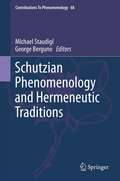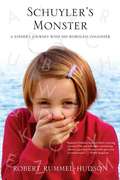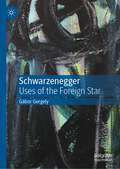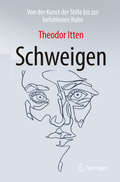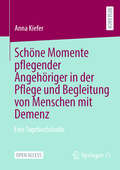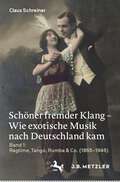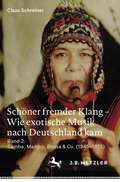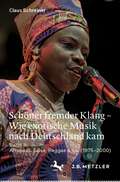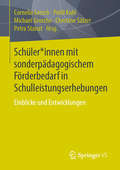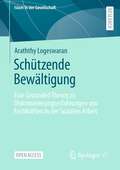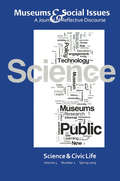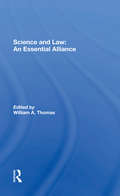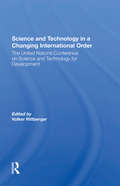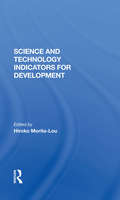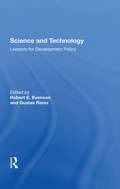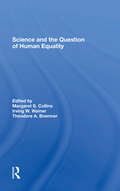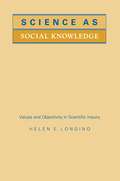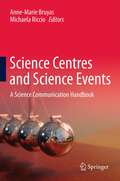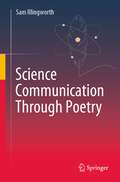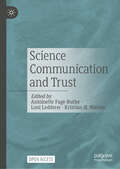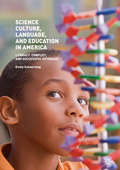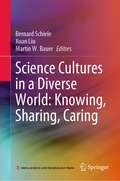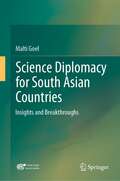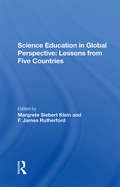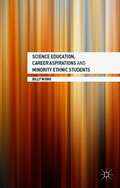- Table View
- List View
Schutzian Phenomenology and Hermeneutic Traditions
by Michael Staudigl George BergunoSchutzian Phenomenology and Hermeneutic Traditions links Alfred Schutz to the larger hermeneutic tradition in Continental thought, illuminating the deep affinity between Schutzian phenomenology and hermeneutics. The essays collected here explore a broad spectrum of Schutzian themes and concerns, from Schutz's concrete affinities to hermeneutic traditions, his interpretationism and the pragmatist nature of Schutz's thought, to questions concerning the role of the media and music in our understanding of the life-world and intersubjectivity. The essays go on to explore the practical applicability of Schutz's thoughts on questions regarding economics, literature, ethics and the limits of human understanding. Given its emphasis on the application of Schutzian ideas and concepts, this book willbe of special interest to a wide range of readers in the social sciences and humanities, who are interested in the application of phenomenology to social, political, and cultural phenomena.
Schuyler's Monster: A Father's Journey with His Wordless Daughter
by Robert Rummel-HudsonWhen Schuyler Rummel-Hudson was eighteen months old, a question about her lack of speech by her pediatrician set in motion a journey that continues today. When she was diagnosed with bilateral perisylvian polymicrogyria (an extremely rare neurological disorder), her parents were given a name for the monster that had been stalking them from doctor to doctor, and from despair to hope, and back again. Once they knew why Schuyler couldn't speak, they needed to determine how to help her learn. They took on educators and society to give their beautiful daughter a voice, and in the process learned a thing or two about fearlessness, tenacity, and joy. More than a memoir of a parent dealing with his child's disability, Schuyler's Monster is a tale of a little girl who silently teaches a man filled with self-doubt how to be the father she needs. Robert Rummel-Hudson has been writing online since 1995. His work has been recognized by the Diarist Awards at diarist. net, including citations for Best Writing, Best Overall Journal, Best Account of a Public or News Event, Best Dramatic Entry, and the Legacy Hall of Fame Award. He has served three times as a featured panelist at JournalCon, an annual conference for online writers. His online writing has been featured in articles in the Austin Chronicle , the Irish Times and the New Haven Register . Robert and his family currently live in Plano, Texas. When Schuyler was 18 months old, a question about her lack of speech by her pediatrician set in motion a journey that continues today. When she was diagnosed with Bilateral perisylvian polymicrogyria (an extremely rare neurological disorder caused by a malformation of the brain), her parents were given a name for the monster that had been stalking them throughout the search for the correct answer to Schuyler''s mystery. Once they knew why she couldnâ t speak, they needed to determine how to help her learn. Schuylerâ s Monster is more than the memoir of a parent dealing with a childâ s disability. It is the honest, funny, and heart-wrenching story of the relationship between a unique and ethereal little girl and her father who struggles with whether or not he is the right dad for the job. It is the story of a family seeking answers to a childâ s dilemma, but it is also a chronicle of their unique relationships, formed without traditional language against the expectations of a doubting world. It is the story of a little girl who silently teaches a man filled with self-doubt how to be the father she needs. "A gripping explication, shot through with equal parts horror and hope, of how parenthood can turn ordinary people into passionate advocates. "â " Neal Pollack, author of Alternadad "Robert Rummel-Hudson is brave enough to reveal the damage the discovery of his child''s condition did to his marriage and to his own sense of self. He manages to repair some of the damage through close involvement with Schuyler and vigorous campaigning on her behalf. His memoir is honest, often painful and deeply personal. "â " Charlotte Moore, author of George & Sam "The book is engaging and honestâ "I''m sure it will help many parents who are struggling to find the most loving way to help their children who have â issues. â "â " Dana Buchman, author of A Special Education "The monster in this heartfelt memoir is polymicrogyria, an extremely rare brain malformation that, in the case of Rummel-Hudson''s daughter Schuyler, has completely impaired her ability to speak. During her first three years, as her parents seek to find out what hidden ''monster'' is causing her wordlessness, they endure ''two years of questions and tests and at least one unsatisfactory diagnosis. '' But while Rummel-Hudson initially rages at God for giving Schuyler ''a life that would never ever be what we''d imagined it to be,'' his depiction of her next four years becomes a study not only in Schuyler''s vivacious and resilient personality, but also in the redeeming power of understanding and a ''stup
Schwarzenegger: Uses of the Foreign Star
by Gábor GergelyThis book analyses the uses of Arnold Schwarzenegger as a foreign star in Hollywood through a film philosophical, de-westernizing and sonic critical framework. It offers very close readings of the film texts, of the roles Schwarzenegger performs, and the rhetorical strategies he adopts outside his film performances to show that in spite of attempts to occupy the position of an emblematic member of the U.S. national body Schwarzenegger remains irrevocably outside as an accented migrant body continuously accumulating markers of belonging that by their very necessity attest to their insufficiency. The book’s central project is to trace back, from the uses to which a migrant star such as Schwarzenegger is put on the screen, the construction of a sense or idea of a U.S. national community through the cinema. Given that the appeal to the American myth of an immigrant nation that promises to erase difference is fundamental to the Schwarzenegger star persona, the central aim of this book is to explore the uses of his stardom as an embodiment of the promise of America and its contradictions and exclusions.
Schweigen: Von der Kunst der Stille bis zur befohlenen Ruhe
by Theodor IttenStille und Schweigen sind im Alltag und in der Politik ständig präsent, aber warum sprechen wir so selten darüber? Wir lieben die Stille, die Ruhe, wenn wir sie brauchen, halten sie aber kaum aus, wenn wir ihr Gegenüber sind. Im Geheimnis verschweigen wir etwas, das uns beschützt und hilft zu leben. Auf der anderen Seite wird manches buchstäblich totgeschwiegen, das zur Sprache gebracht werden müsste, um Heilung zu ermöglichen. Untertanen werden mit diktatorischem Gehabe zum Schweigen gebracht – eine kommunikative Machtdemonstration.Dieses Buch beschreibt und analysiert aus sozialpsychologischer, kulturhistorischer und philosophischer Perspektive das menschliche Verhalten im Bezug zur Stille. Eindrucksvoll bringt der Autor zu Wort, was seine Erfahrungen, Gedanken, Textforschungen und Expertengespräche rund um dieses vielschichtige Thema hergeben, und lässt so neue, überraschende Verbindungen zwischen Stille, Schweigen und Ruhegeben entstehen. Ein erzählender Wegweiser mit nachdenklich stimmenden und amüsanten Erkenntnissen für alle Menschen, die dem Schweigen in all seinen Aspekten auf den Grund gehen möchten.
Schöne Momente pflegender Angehöriger in der Pflege und Begleitung von Menschen mit Demenz: Eine Tagebuchstudie
by Anna KieferIn diesem Open Access-Buch wird gezeigt, wie pflegende Angehörige mit Hilfe einer Tagebuchvorlage auf die Wahrnehmung schöner Momente in der Begleitung ihrer an Demenz erkrankten Familienmitglieder sensibilisiert werden können. Tagebücher sind eine beliebte Möglichkeit zur Verarbeitung und Bewältigung von Krisensituationen und können dabei der Selbstreflexion und Belastungsverarbeitung dienen. Insbesondere positives Schreiben kann durch das Erinnern und Reflektieren schöner Momente und Emotionen nachweislich zu einem höheren Wohlbefinden und zur Steigerung der Selbstwirksamkeit führen. Die Begleitung eines Menschen mit Demenz geht für pflegende Angehörige häufig mit einer Vielzahl an Belastungen und Herausforderungen einher, weshalb diese häufig aus der Belastungsperspektive erlebt wird. Schöne Momente innerhalb der Sorgebeziehung zwischen pflegenden Angehörigen und Menschen mit Demenz werden dabei seltener bewusst wahrgenommen. Die Ergebnisse der Tagebuchstudie zeigen individuelle Auswirkungen der Wahrnehmung und Sensibilisierung schöner Momente.
Schöner fremder Klang – Wie exotische Musik nach Deutschland kam: Band 1: Ragtime, Tango, Rumba & Co. (1855–1945)
by Claus SchreinerIn seiner großen Geschichte der ‚exotischen‘ populären Musik beschreibt Claus Schreiner den transatlantischen Weg all der uns heute vertrauten Musikstile von ihren Ursprüngen nach Europa und Deutschland. Er berichtet im ersten von drei Bänden, wann und wie es zu ersten Begegnungen von Europäern mit afroamerikanischen Künstlern kommt und wie Charleston, Ragtime, Jazz, Tango, Maxixe, Rumba, Biguine in Kolonialzeiten und in den Küstenstädten Lateinamerikas entstehen. Die Aufnahme, Anverwandlung und Amalgamierung der vielen fremden Musikstile in den Metropolen Europas wird im Hauptteil des Buches lebendig und mit vielen Künstlerbiographien, Songtexten und Geschichten beschrieben. Wie gingen die Deutschen zwischen Kaiserreich und NS-Staat mit den exotischen Tänzen und den Künstlerinnen und Künstlern um? Welche Rolle spielten Musikethnologie, Unterhaltungsindustrie, Zeitgeist und die Folgen von Krieg, Kolonialzeit und Nationalsozialismus? Das Buch zeichnet ein deutliches Bild von der überragenden Rolle der ‚exotischen‘ Musik für die populäre Kultur der Moderne.
Schöner fremder Klang – Wie exotische Musik nach Deutschland kam: Band 2: Samba, Mambo, Bossa & Co. (1945–1975)
by Claus SchreinerIn seiner großen Geschichte der ‚exotischen‘ populären Musik beschreibt Claus Schreiner den transatlantischen Weg all der uns heute vertrauten Musikstile von ihren Ursprüngen nach Europa und Deutschland. Der zweite Teil beginnt mit der Nachkriegszeit. Die Isolation Deutschlands von vormals verbannten ‚exotischen‘ Einflüssen endet. Träume von einsamen Inseln werden im Nachkriegs- und Wirtschaftswunderland nicht nur von einfältigen Schlagertexten, sondern auch von Samba, Baião und Bossa Nova aus Brasilien bedient, dann kommen Mambo und Chachachá aus New York und Kuba und der Calypso. Auf deutschen Bühnen zeigen Tanz-Ensembles aus den jungen afrikanischen Staaten, aus Brasilien, Mexiko und Korea Mischungen aus Folklore und Ballett. Aus den USA weht die Folk-Welle herüber und initiiert nicht nur Festivals wie Waldeck, sondern auch erste Begegnungen mit internationaler Folklore, denen Protestsongs mit den Krisen der sechziger Jahre folgen, an die sich in einer Welle der Solidarität Musik chilenischer Exilgruppen und der Künstler aus anderen lateinamerikanischen Diktaturen anschließt. Mit El Condor Pasa beginnt die Invasion der Poncho-Gruppen in die Fußgängerzonen.
Schöner fremder Klang – Wie exotische Musik nach Deutschland kam: Band 3: Afrobeat, Salsa, Reggae & Co. (1975-2000)
by Claus SchreinerIn seiner großen Geschichte der ‚exotischen‘ populären Musik beschreibt Claus Schreiner den transatlantischen Weg all der uns heute vertrauten Musikstile von ihren Ursprüngen nach Europa und Deutschland. Der dritte Band beginnt mit der Musik Afrikas und ihrer Ankunft in Europa. Back to Africa: Reggae-Wurzeln und die deutsche Szene, wo das Interesse nicht nur an den Urvätern des Reggae wächst. Man will mehr Originale erleben, traditionell oder populär, und schafft neue Festivals, die oft mit Workshops und Informationen begleitet werden. Das New Age-Zeitalter beginnt und lässt Musiker in esoterischen Quellen schöpfen. Japanische Trommelgruppen lassen Konzertsäle erbeben und Butoh-Tänzer erinnern an den Ausdruckstanz der zwanziger Jahre. Musik aus vielen ‚exotischen‘ Wurzeln bietet sich als Alternative zu Belanglosem in Spaßgesellschaft, Disco und Neuer Deutscher Welle und als Begleitung von Aktionen gegen Rassismus, Hungersnöte und Fremdenfeindlichkeit an. Salsa aus Puerto Rico und New York bringt endlich mehr Körperlichkeit in deutsche Tanzclubs und bereitet den Boden für nostalgisches Buena Vista-Feeling, das von Modetänzen wie Lambada, Merengue und Zouk abgelöst wird. Latinmusic sorgt auch in Deutschland für Hits. Am Ende des Jahrhunderts ist das Angebot überreichlich vorhanden und man nennt es Weltmusik.
Schüler*innen mit sonderpädagogischem Förderbedarf in Schulleistungserhebungen: Einblicke und Entwicklungen
by Poldi Kuhl Petra Stanat Cornelia Gresch Christine Sälzer Michael GroscheDieser Band bringt Beiträge zusammen, die sich aus unterschiedlichen fachlichen Perspektiven mit der Einbeziehung von Schüler*innen mit sonderpädagogischem Förderbedarf in Schulleistungserhebungen beschäftigen. Hierbei werden insbesondere Spannungsverhältnisse zwischen standardisierten Erhebungsverfahren und individualisierten Herangehensweisen reflektiert und Empfehlungen zur Qualitätssicherung in zukünftigen Studien abgeleitet.Der InhaltKonzeptionelle Aspekte der Diagnose von sonderpädagogischem Förderbedarf • Herausforderungen bei der Sicherstellung internationaler Anschlussfähigkeit von Forschung zur Situation von Schüler*innen mit sonderpädagogischem Förderbedarf in Deutschland • Methodische Aspekte der Einbeziehung von Schüler*innen mit sonderpädagogischem Förderbedarf in Schulleistungserhebungen • Erkenntnisse zu ausgewählten Bedingungen und Erträgen schulischer InklusionDie Herausgeber*innenDr. Cornelia Gresch ist wissenschaftliche Mitarbeiterin und Co-Leiterin des Projekts „INSIDE- Inklusion in der Sekundarstufe I in Deutschland” am Institut zur Qualitätsentwicklung im Bildungswesen (IQB) an der Humboldt-Universität zu Berlin.Dr. Poldi Kuhl ist Juniorprofessorin für Bildungswissenschaft an der Leuphana Universität Lüneburg.Dr. Michael Grosche ist Professor für Rehabilitationswissenschaften mit dem Förderschwerpunkt Lernen am Institut für Bildungsforschung an der Bergischen Universität Wuppertal.Dr. Christine Sälzer ist Professorin für Erziehungswissenschaft an der Universität Stuttgart.Dr. Petra Stanat ist wissenschaftlicher Vorstand des Instituts zur Qualitätsentwicklung im Bildungswesen (IQB) an der Humboldt-Universität zu Berlin und Professorin an der Humboldt-Universität zu Berlin.
Schützende Bewältigung: Eine Grounded Theory zu Diskriminierungserfahrungen von Fachkräften in der Sozialen Arbeit (Islam in der Gesellschaft)
by Araththy LogeswaranIn diesem Open-Access-Buch wird eine qualitative Studie zum Thema Diskriminierungserfahrungen von Fachkräften der Sozialen Arbeit vorgestellt. Ziel der Arbeit ist es, eine gegenstandsverankerte Theorie abzubilden, die hilft, den Umgang mit Diskriminierungserfahrung – insbesondere Rassismuserfahrungen – zu beschreiben: Wie verhalten sich Betroffene in diskriminierenden Situationen? Wie gehen sie mit ihren Erfahrungen außerhalb der diskriminierten Situation um? Einer der Schwerpunkte der Untersuchung ist das Zusammenspiel der Erfahrungen und des professionellen Arbeitskontextes. Das Theoriemodell der Schützenden Bewältigung ist ein Beitrag zur rassismuskritischen Sozialen Arbeit und lädt zu einem Perspektivenwechsel ein. Die theoretischen Überlegungen bieten gleichzeitig Anknüpfungspunkte für die Praxis.
Science & Civic Life: Museums & Social Issues 4:1 Thematic Issue (Museums & Social Issues)
by Kris Morrissey Robert GarfinkleFirst Published in 2017. Routledge is an imprint of Taylor & Francis, an Informa company.
Science And Law: An Essential Alliance
by William A ThomasLaw and science are pervasive in society, and we depend upon their fruitful collaboration to promote stability and progress. The substance and procedures of law guide our judicial, legislative, and administrative systems. Science and technology stimulate our imagination and contribute to the production and distribution of virtually all goods and services. The need for scientists and lawyers to understand the strengths and limitations of each other's profession has never been more apparent.
Science And Technology In A Changing International Order: The United Nations Conference On Science And Technology For Development
by Volker RittbergerAs part of its contribution to the 1979 United Nations Conference on Science and Technology for Development IUNCSTD) the United Nations Institute for Training and Research jUNITAR) organized an informal research group to assess various aspects of applying science and technology to development through the United Nations system. This research group was constituted in early 1978 at the initiative of Dr. Robert S. Jordan, former Director of Research at UNITAR, and was headed by Professor Volker Rittberger, a UNITAR Special Fellow. One of the activities of this group has been the production of a series of working papers on science and technology. These papers seek to provide preliminary analyses rather than definitive conclusions. Their purpose is to facilitate the access of others to the ongoing work of the group and to stimulate critical comments and reactions leading to further improvement of this work.
Science And Technology Indicators For Development
by Hiroko Morita-louThe current indicators used to measure the impact of science and technology in developing countries have been formulated based on conditions and assumptions that are primarily relevant to developed countries. The contributors to this volume contend that these indicators, when applied to developing countries, often lead to inaccurate conclusions. An
Science And Technology: Lessons For Development Policy
by Gustav Ranis Robert EvensonThis book presents several general theoretical notions about the process of science and technology as it relates to development. It develops the international dimension of science and technology in terms of the international exchange processes and the appropriateness and modification of technology.
Science And The Question Of Human Equality
by Margaret S Collins Irving W Wainer Theodore A. BremnerThis book provides an interdisciplinary look at racism and science, investigating the biological and social realities of individual and group differences. The contributors examine race and racial distinctions, environmental versus genetic contributions to IQ and to cognitive skill level, the impact of biocultural interactions on behavior, and the problems of achieving an objective appraisal of inter- and intragroup differences in humans. They also consider a possible model for cultural and biological evolution, recommending a careful selection of models and methods of approach for sciences concerned with the study of man. The book includes recent findings in the area of race and IQ, documents instances of racism and classism, and analyzes factors underlying these phenomena.
Science As Social Knowledge: Values And Objectivity In Scientific Inquiry
by Helen E. Longino<P> Conventional wisdom has it that the sciences, properly pursued, constitute a pure, value-free method of obtaining knowledge about the natural world. <P>In light of the social and normative dimensions of many scientific debates, Helen Longino finds that general accounts of scientific methodology cannot support this common belief. Focusing on the notion of evidence, the author argues that a methodology powerful enough to account for theories of any scope and depth is incapable of ruling out the influence of social and cultural values in the very structuring of knowledge. <P>The objectivity of scientific inquiry can nevertheless be maintained, she proposes, by understanding scientific inquiry as a social rather than an individual process. Seeking to open a dialogue between methodologists and social critics of the sciences, Longino develops this concept of "contextual empiricism" in an analysis of research programs that have drawn criticism from feminists. <P>Examining theories of human evolution and of prenatal hormonal determination of "gender-role" behavior, of sex differences in cognition, and of sexualorientation, the author shows how assumptions laden with social values affect the description, presentation, and interpretation of data. <P>In particular, Longino argues that research on the hormonal basis of "sex-differentiated behavior" involves assumptions not only about gender relations but also about human action and agency. She concludes with a discussion of the relation between science, values, and ideology, based on the work of Habermas, Foucault, Keller, and Haraway.
Science Centres and Science Events
by Anne-Marie Bruyas Michaela RiccioThe idea for this text stemmed from the fruitful experience gathered during the training course of 9 Nigerian university students organized in Naples from 3 to 18 September 2008 by the team of Fondazione IDIS-Città della Scienza under the project Science Centre Owerri. The training course turned out to be not only an educational opportunity to acquire knowledge and skills for these students, but also a real and practical tool that later led to the realization of the first Science Festival of Owerri in Nigeria in May 2009. This in turn sparked the idea of creating a highly practical handbook for those who want to face the challenge of developing new projects for the dissemination and socialization of science in developing countries. In these countries, the role of scientific education and training in schools is not sufficient to arouse scientific curiosity among young people and make the population aware of the importance of scientific knowledge in everyday life. Moreover science and technology are indispensable tools for people's empowerment and should be supported with actions that encourage curiosity about science and the intelligent use of technology to bridge the divide with developed countries. It is therefore necessary to set up activities that are carefully targeted to promote and communicate science. The text has been designed as a practical guide to be used in a variety of contexts: scientific events or more structured science festivals, training, the creation of scientific cultural associations, and the development of new science centres. Besides being an excellent tool for training and supporting the design and planning phases, the manual can also be used as a reference work for institutions and local cultural services which have to select projects of this type.
Science Communication Through Poetry
by Sam IllingworthScience Communication Through Poetry aims to explore how we might communicate science effectively both to and with non-scientific audiences across the spectrum of science communication, from dissemination to dialogue, via the medium of poetry. It has been written for scientists, science communicators, public engagement practitioners, and poets, so that they can learn how to use poetry as an effective tool through which to diversify science. As well as containing specific advice and guidance for how to use poetry to communicate science with different audiences, this book contains a number of exercises for the reader to reflect on what has been learnt and to put into practice what is discussed. Further study and additional readings are also provided to help improve knowledge, understanding, and familiarity with both poetry and science communication.
Science Communication and Trust
by Antoinette Fage-Butler Loni Ledderer Kristian H. NielsenThis open access book presents groundbreaking research, offering new empirical findings, showcasing a range of different methods, and advancing theoretical perspectives relating to science communication and trust. The investigation of science communication and trust is enhanced by the many international scholars and disciplinary approaches featured. The book includes three thematic sections: the first focuses on the role of trustworthy science communicators, the second is concerned with the varying contexts of science communication for trust, while the third unpacks various features of trust in science. The volume thus provides the reader with invaluable insights into the highly salient topic of science communication and trust.
Science Culture, Language, and Education in America: Literacy, Conflict, And Successful Outreach
by Emily SchoerningCan the culture and language of science be an alienating force that discourages marginalized people from identifying with scientists and pursuing higher education in the sciences? More broadly, does an education system which unwittingly presents science as a distinct culture result in a population susceptible to doubt, confusion, and denial? This volume explores how this 'culture of science' is reflected and transmitted in the classroom, and how this can have wide-reaching and often negative implications for science education and science literacy. Well-intentioned efforts to bring hands-on scientific experiences into the classroom must also take into account how students perceive the culture of science. Areas of potential conflict include linguistic and cultural behaviors, misconceptions about science and the nature of science, and, in some cases, religious worldviews. Once recognized, these conflicts are resolvable, and valid methods exist to reduce alienation, broaden participation, and ensure that all students, whether or not they pursue STEM careers, leave school knowing that science is something that they can trust.
Science Cultures in a Diverse World: Knowing, Sharing, Caring
by Xuan Liu Bernard Schiele Martin W. BauerScience and technology culture is now more than ever at the very heart of the social project, and all countries, to varying degrees, participate in it: raising scientific literacy, improving the image of the sciences, involving the public in debates and encouraging the young to pursue careers in the sciences. Thus, the very destiny of any society is now entwined with its ability to develop a genuine science and technology culture, accessible for participation not only to the few who, by virtue of their training or trade, work in the science and technology fields, but to all, thereby creating occasions for society to debate and to foster a positive dialogue about the directions of change and future choices.This book organized on the theme of ‘knowing, sharing, caring: new insights for a diverse world’, which was derived from the observation that globalization rests upon diversity—diversity of contexts, publics, research, strategies and new innovating practices—and aims to stimulate exchanges, discussions and debates, to initiate a reflection conducive to decentring and to be an opportunity for enrichment by providing the reader with means to achieve the potentialities of that diversity through a comparison of the visions that underpin the attitudes of social actors, the challenges they perceive and the potential solutions they consider.Thus, this book aims first and foremost to raise questions in such a manner that readers so stimulated will feel compelled to contribute and will do so. In this spirit, however significant, the results presented and shared are less important than the questions they seek to answer: How are we to rethink the diffusion, the propagation and the sharing of scientific thought and knowledge in an ever more complex and diverse world? What to know? What to share? How do we do it when science is broken down across the whole spectrum of the world’s diversity?The book is recommended for those who are interested in science communication and science cultures in the new media era, in contemporary social dynamics, and in the evolution of the role of the state and of institutions. It is also an excellent reference for researchers engaging in science communication, public understanding of science, cultural studies, science and technology museum, science–society relationship and other fields of humanities and social sciences.
Science Diplomacy for South Asian Countries: Insights and Breakthroughs
by Malti GoelThis book provides a science diplomacy outlook as a new governance tool in international cooperation. It elaborates on India's current S&T collaboration with Afghanistan, Bangladesh, Bhutan, Maldives, Myanmar, Nepal, Pakistan, Sri Lanka, and science policy and science diplomacy in India. The book introduces concepts and contours of science diplomacy with international examples. It presents insights into international governance models, mega-science projects, and science diplomacy's role in addressing global climate change and sustainable development challenges. The book is a valuable reference to spark breakthroughs in India’s science diplomacy with its neighbouring countries for scientists, diplomats, policymakers, government, and non-government institutions interested in science and diplomacy.
Science Education In Global Perspective: Lessons From Five Countries
by Margrete Siebert Klein F. James Rutherford F James Rutherford Margrete S. KleinThe decline in the quality of American public school instruction, particularly in science and mathematics, is a well-documented subject of concern for our nation. This book examines the educational systems in Japan, the People's Republic of China, East and West Germany, and the Soviet Union, countries that have developed particularly innovative app
Science Education, Career Aspirations and Minority Ethnic Students
by Billy WongIs science typically for White men? Is science for 'people like us'? What are the barriers and opportunities? This book explores the science career aspirations of minority ethnic students. It investigates the views, experiences and identities of British Black Caribbean, Bangladeshi, Chinese, Indian and Pakistani youths in relation to science.
